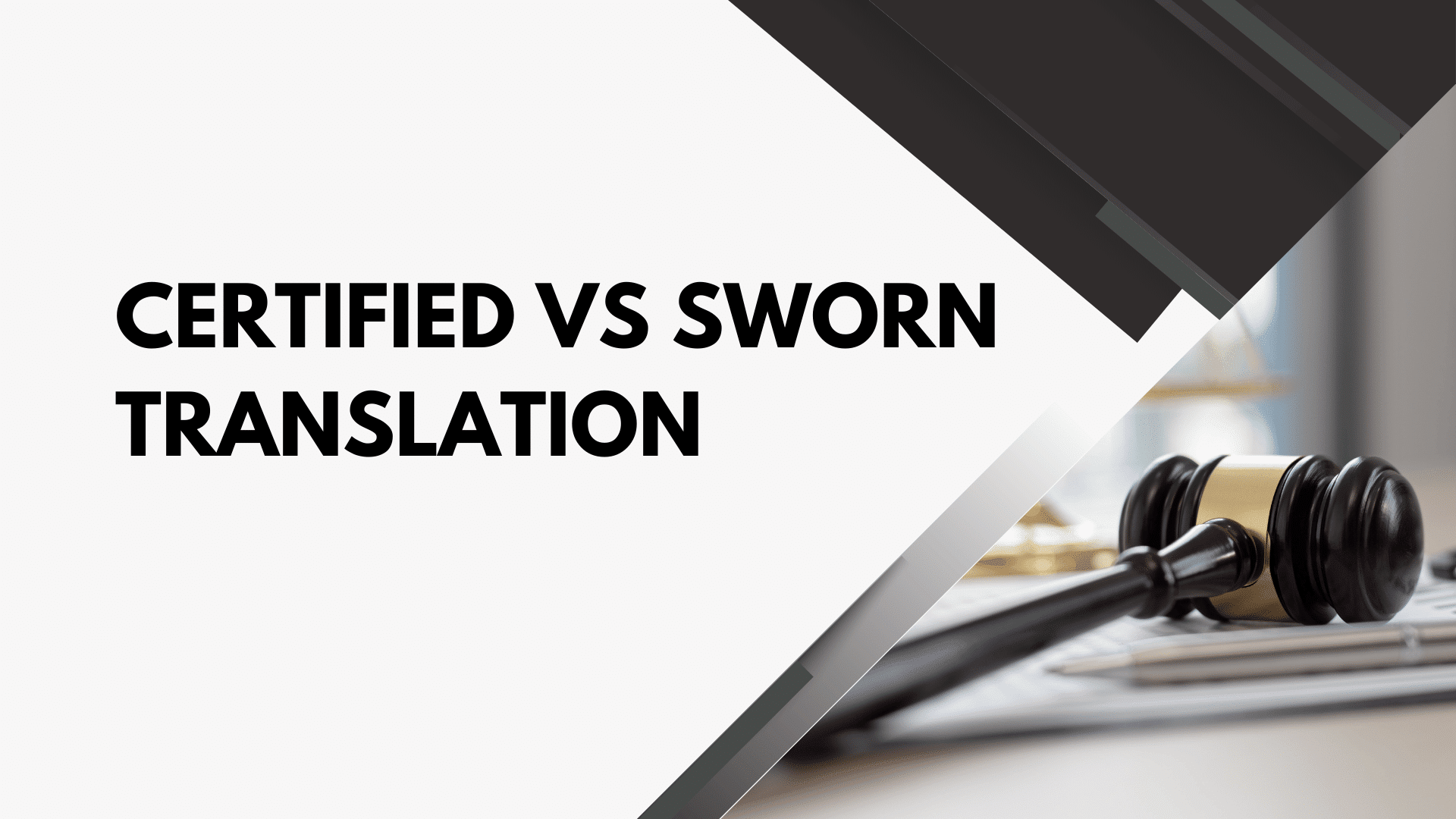Oftentimes documents that are requested by government authorities or other official bodies contain information of critical importance.
These documents need to be accurately and reliably translated to prevent fraud and ensure that no relevant data is lost
Thus, when it comes to translating these documents, official translation services, such as sworn and certified translation are a must.
To eliminate any ambiguity, in this blog, we’re going to focus on two translation terms that often surface and lead to misunderstandings.
Sworn vs certified translation are two different types of translation that cater to specific legal and official requirements.
In this blog, we will explore in more detail what exactly constitutes each of these types of translation and what the key differences between them are.
Looking for sworn translation services?
We offer sworn translation services in 70+ languages, ensuring legally certified accuracy for your documents.
Sworn translation
Let’s start with the term “sworn translation.”
Interestingly, the name of this type of translation stems from the fact that in some cases, translators are required to swear an oath that they will provide accurate and truthful translations.
What does sworn translation mean?
A sworn translation is an official, legally recognized by certain authorities or institutions, translation of a document. It is usually delivered by a so-called “sworn translator” who is authorized by a government or a judicial authority to issue this type of translation.
The translator verifies the translation’s accuracy and fidelity to the original by signing and stamping the end translation.
This so-called sworn translation is often required for legal documents that are submitted to official institutions, such as courts, government bodies, or other official entities.

Legal recognition and requirements in different countries
In short, the requirements vary by country.
For instance, in countries like France, Spain, and Brazil, sworn translations are often mandatory for official use.
Interestingly, however, not every country recognizes and authorizes sworn translators. And while this type of translation is very common in Europe, countries like the US, Australia, Canada, and the UK do not operate such a system to authenticate official translations.
In general, each country has its own legal system to approve and authorize sworn translators who can then deliver sworn translations.
The method is usually unique for each country, but some common procedures include swearing an oath in front of a court or lawyer that the translator has completed an authentic and truthful translation of the original document.
Who is a sworn translator? What qualifications and certifications are needed?
A sworn translator is a professional translator who is authorized by a court or government body to deliver legally binding translations.
Qualifications and certifications often include advanced language proficiency, legal knowledge, and passing certification exams.
In some countries, sworn translators must be officially appointed or licensed by government authorities.
Most importantly, however, sworn translators can be sworn only for specific language pairs and their authorization needs to be renewed.
What’s more, sworn translators in Europe are given stamps. The stamp is placed on the translated document as an additional proof of the authenticity of the translation. In fact, the stamp gives the translation a legal value in front of courts and official authorities.
For example, in France, to be granted a certification for a sworn translator, one needs to pass a language and legal knowledge exam, undergo a background check and prove a clean criminal record. Finally, the initial certification is granted for 3 years and should be renewed every 5 years.
In Brazil, there are additional requirements. For instance, one needs to be a Brazilian citizen to become a sworn translator. Another requirement is to have lived for at least a year in the state where you want to provide translation services.
Which documents require sworn translation?
Common documents include:
- birth Certificate, prenuptial agreement and marriage certificates,
- academic records, contracts,
- legal judgments,
- financial statements
- and immigration-related papers.
Such documents are often required for legal purposes, international applications, or official submissions.
Certified translation
What does “certified translation” mean?
A certified translation is an official translation that is accompanied by a signed statement from the translator or translation agency that has issued the translation.
In this way, the translator attests that the translation is complete and accurate.
This signed statement or certification ensures that the translation is recognized by authorities for legal or official purposes.

Which documents require a certified translation?
This type of translation often required for official documents, such as:
- birth certificates,
- marriage licenses,
- immigration papers,
- academic transcripts,
- financial statements
- contracts and court documents.
- medical records
- patents
- documents for regulatory approvals

Certified translation is mandatory when providing documents for institutions, such as government agencies, industry bodies, banks, educational institutions, or legal processes.
At Milestone we provide certified translation services accepted by all regulatory authorities. Our expertise covers a wide range of documents, ensuring accuracy and compliance for personal and business needs.
Also read: Legal Translation : Importance, Challenges & Best Practices
Get accurate certified translation services for your documents
We offer certified translation services that ensure your documents are both accurate and accepted by regulatory authorities worldwide.
Difference between certified and sworn translation

When deciding between sworn vs certified translation it’s important to know that they serve different purposes depending on the legal or institutional requirements.
Thus, it’s paramount to understand their differences.
The translator
A certified translator can be any professional translator who provides a signed certification to attest the authenticity of the translated document.
A sworn translator, on the other hand, must be legally recognized or appointed by a government or judicial body to translate official documents.
Legal status
Certified translations are widely used all over the world. However, they don’t carry inherent legal status unless specifically required by an institution or an authority.
Sworn translations, in contrast, do have legal status automatically.
Hence, they are often required for court cases, legal documents, or official government submissions.
Cost
Another big difference between certified vs sworn translation is the cost since sworn translation is more expensive.
When it comes to sworn translation, the translator should provide the original stamped and signed documents while in certified translation, a soft copy and a digital signature are sufficient.
Geographical Use
The debate between sworn vs certified translation often depends on the geographical location since certified translations are more commonly used in countries like the US, the UK, and Australia.
Sworn translations are more prevalent in European countries.
However, they are required by the local authorities in countries in other continents. For instance, in Brazil and South Africa, legal authorities require them.
Scope of Use
Certified translations are often requested for official documents, such as academic records, visa applications, or business documents.
Sworn translations are typically associated with legal documents, such as contracts, court rulings, and documents for government authorities.
Common Misconceptions About Sworn and Certified Translations
There are several common misconceptions surrounding sworn vs certified translations that can cause confusion when preparing official documents.
Let’s clear up a few of these misunderstandings:
“They are the same.”
While both serve distinct legal and regional purposes, they are not the same.
A sworn translation is issued by a translator officially authorized by a court, a government, or an official institution.
A certified one, on the other hand, can be done by any translator who provides a signed statement for the authenticity of the translation. Certified translators are not appointed by the government or any other official institution.
“Any translator can provide these services.”
Not all translators can offer sworn vs certified translation services.
Only translators, who are legally authorized by government bodies or courts, can provide sworn translations.
Certified translations, on the other hand, must be done by a professional who is proficient in the language and willing to sign an accuracy statement, but they don’t need to be authorized by a government authority.
“They are only needed for legal documents.”
While sworn and certified translations are often required for legal documents, they are also necessary for a variety of other purposes, such as immigration papers, academic transcripts, and business agreements or documents like birth certificates, diplomas, or contracts being used in official government proceedings.
Conclusion
Understanding the differences between sworn vs certified translation is key to choosing the right service for your needs.
Each of these types of translation has its distinct characteristics and legal requirements, and a thorough understanding of these is greatly beneficial.
To ensure that you choose the right service, however, always work with a reliable language service provider who can offer both guidance and accurate translation services.
At Milestone we specialize in both certified and sworn translation services, tailored to meet your specific needs. Our certified translations come with a statement of accuracy, while our sworn translations are legally recognized with an official seal.
Get In touch for your certified and sworn translations
Also read: Legal Translation – 6 Practical Tips for Translating Legal Documents
Are you looking for a reliable legal translation agency?
We provide high-quality legal translation services in Chinese, Japanese, Hindi, and 70+ languages.




